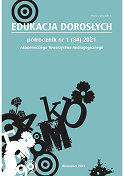„Nasze pokolenie tamagotchi” - obraz dorosłości w polskich utworach rapowych
“Our Tamagotchi generation” - image of adulthood in Polish rap songs
Author(s): Martyna PryszmontSubject(s): Education, Music, Adult Education, Sociology of Art
Published by: Akademickie Towarzystwo Andragogiczne
Keywords: Hip-hop culture; rap music; adulthood; education;
Summary/Abstract: Hip-Hop culture is an interesting learning source for people who come into contact with its works. It is up-to-date, living, dynamic and its characteristic feature is that it refers to the daily lives of its creators. In her presentation, the author will focus on rap music which conveys many relevant descriptions of adult life in the modern world. Rap is both, music and poetry (Kukłowicz 2014), and rapping is the form of rhythmic speaking or reciting rhyming words with specific accompaniment (or without music). Rappers address the problems of daily life by combining the content and the so-called flow, that is rhythm, rhyme and rap (Miszczyński 2015). The author is interested in rap (hip-hop) songs as the important pop culture texts which definitely have some andragogical potential. They are the examples of creative activity of adults as the texts refer directly to the adulthood. In her analysis, the author focused on the image of adulthood presented in the selected Polish rap songs (see Węcławek, Flint, Kleyff, Cała, Jaczyński 2014). The main research problem focuses on the image of adulthood that emerges from the selected rap works. The author also wonders what the potential of rap works for adults is. Such analysis seems particularly interesting and valuable in the context of reflections over the adult learning environments. To study the problem, the author used document analysis of the selected rap works. The results show that rappers present a critical diagnosis of the daily life of Poles. They comment the reality by referring to their individual experiences and the experiences of people in their reference groups or communities they associate with. The image of adulthood is a mosaic of these different experiences. They also point to the learning environments of adults who make efforts to build the worlds to live in.
Journal: Edukacja Dorosłych
- Issue Year: 83/2020
- Issue No: 2
- Page Range: 63-84
- Page Count: 22
- Language: Polish

